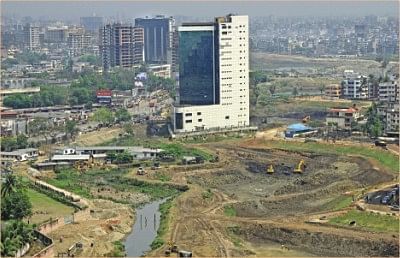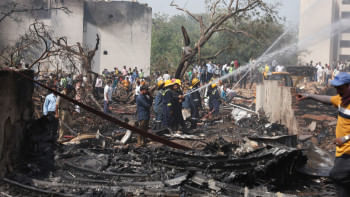Demolish BGMEA highrise: HC

The 15-storey BGMEA Bhaban on Begunbari-Hatirjheel canal is seen on the foreground near Sonargaon Hotel in the capital.Photo: SK Enamul Haq
The High Court has ordered the authorities to demolish the 15-storey BGMEA building on Begunbari-Hatirjheel canal, saying it was built on a land acquired through forgery and earth-filled illegally.
In a judgement yesterday, the court asked the tenants to vacate the building and move their belongings within 90 days from the date of receiving the copy of the verdict.
Bangladesh Garment Manufacturers and Exporters Association, owner of the building, did not take approval of the plan and construction from Rajdhani Unnayan Kartripakkha (Rajuk), said the judgement.
BGMEA will appeal to the Supreme Court against the verdict, its lawyer Rokanuddin Mahmud told The Daily Star.
Justice AHM Shamsuddin Chowdhury Manik and Justice Sheikh Md Zakir Hossain delivered the judgement after hearing a suo moto rule issued by another HC bench on October 3 last year seeking explanation why the BGMEA building should not be demolished.
The rule was issued following a newspaper report on October 2 that the building was constructed without Rajuk approval.
Deputy Attorney General ABM Altaf Hossain said the BGMEA authorities have to demolish the building at their own cost, as per the HC directives.
Foundation of the building was laid by the then prime minister Sheikh Hasina in 1998, and it was opened by the then premier Khaleda Zia in 2006.
The HC in its judgement said a forgery has taken place in respect of handing over possession of the land to the BGMEA, which is a criminal offence.
And it ordered the inspector general of police, commissioner of Dhaka Metropolitan Police and deputy commissioner of Dhaka to investigate the allegations and take necessary steps.
The court said records submitted by the office of the DC of Dhaka proved the land was acquired for the East Bengal Railway in 1910, and it was in the possession of Bangladesh Railway till 2006. The railway authorities handed over the land to Export Promotion Bureau (EPB) in 2006.
Surprisingly, it has been found in the sale deed submitted by the BGMEA to Rajuk that it purchased the land from the EPB in 2001, the HC said, adding it is necessary to investigate how the BGMEA purchased the land in 2001.
The court said the forgery in handing over the land to the BGMEA is tantamount to land grabbing with a gang of frauds involved in the process.
Possession of the land must be reverted to the DC of Dhaka, and the DC will be entitled to use the land for public purposes, it said.
The HC said people who have invested money for purchasing flats and some parts of this building can take legal steps as per the Contract Act and Tort Act for remedy in this regard.
It directed the authorities to restore the water bodies in Begunbari-Hatirjheel area after demolishing the building.
It also asked the Department of Environment to investigate whether the building damaged the water body's environment, and take appropriate legal steps.
The court observed that investors in the building did so knowing fully it was constructed illegally, and they are only to blame themselves.
Senior judge of the bench Justice Shamsuddin Chowdhury Manik, who read out the verdict, said the acquired land must be used for public welfare, and it cannot be handed over to any private organisation like the BGMEA.
Violation of law has taken place in respect of handing over the land to the BGMEA through the EPB, the judge said.
The building has been constructed on a water body by blocking the normal flow of Begunbari canal in violation of the Water Bodies Act, which is a criminal offence, he said.
As per the statement submitted by Rajuk, it found that the BGMEA paid a fine of over Tk 12 lakh to Rajuk for not taking its approval in constructing the building, but the payment did not legalise the construction, the judge said.
Even, Rajuk cannot approve construction of any structure by the BGMEA on the land which is not owned by it (BGMEA), he said.
Advocate DHM Muniruddin placed the report before the HC, and said the BGMEA building was built illegally.
The HC bench heard opinions from amici curiae Fida M Kamal, Anisul Huq, Syeda Rizwana Hasan, Manzill Musrshid and Iqbal Kabir.
Deputy Attorney General Mostafa Zaman Islam appeared for Rajuk.

 For all latest news, follow The Daily Star's Google News channel.
For all latest news, follow The Daily Star's Google News channel. 



Comments